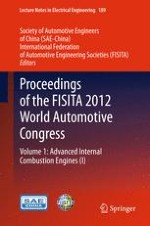2013 | OriginalPaper | Buchkapitel
Fuel Formulation for Future Drive Train Developments
verfasst von : Máté Zöldy, András Holló, Zoltán Szerencsés, Ferenc Kovács, Róbert Auer
Erschienen in: Proceedings of the FISITA 2012 World Automotive Congress
Verlag: Springer Berlin Heidelberg
Aktivieren Sie unsere intelligente Suche, um passende Fachinhalte oder Patente zu finden.
Wählen Sie Textabschnitte aus um mit Künstlicher Intelligenz passenden Patente zu finden. powered by
Markieren Sie Textabschnitte, um KI-gestützt weitere passende Inhalte zu finden. powered by
